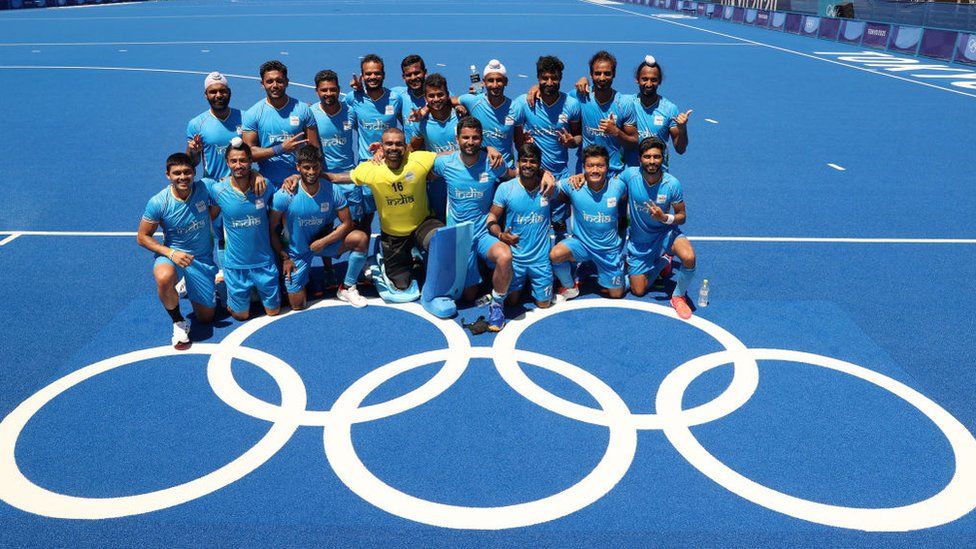India have beaten Germany 5-4 to to win an Olympic medal in men’s hockey after 41 years. The thrilling victory is the result of a young Indian side’s dogged performance, writes sports journalist Harpal Singh Bedi.
“Impossible is nothing” legendary boxer Muhammad Ali once said.
The Indian men’s hockey team relived that epic quote as they staged an incredible fightback – from being down 1-3 they went on to beat Germany 5-4 to claim an Olympic bronze.
India lost only two matches in Tokyo and the teams they lost to – Australia and Belgium – are playing each other in the final.
India’s showing offers hope after decades for men’s hockey. The team has won eight Olympic gold medals, making it the most successful team ever, but the last gold was won in 1980 in Moscow.
But the path to the bronze in Tokyo was somewhat of a rollercoaster.
India finished second in its group with four wins, some more emphatic than others (3-2 against New Zealand, 3-0 against Spain, 3-1 against Argentina and 5-3 against Japan) and one humiliating 1-7 defeat at the hands of Australia.
India beat Great Britain 3-1 in the quarter-finals, sparking fresh hope, but lost 2-5 to Belgium in the semi-final.
Thursday’s win, however, was an edge-of-the-seat affair. Simranjeet Singh’s two goals (17′, 34′), and one apiece from Hardik Singh (27′), Harmanpreet Singh (29′) and Rupinder Pal Singh (31′) were just as crucial as PR Sreejesh’s outstanding saves in the dying seconds of the game.
The forwards have certainly been efficient and impressive, but it was Sreejesh who scripted India’s medal-winning journey. If not for him, the team would have struggled much more to make it this far.
India took time to settle down in the quarter-final against a lacklustre Great Britain before eventually scoring a 3-1 win. A stunning goal from Hardik Singh in the last moments came after some nail-biting moments.
Germany played the first quarter with incredible pace and displayed their intent to put India on the back foot right from the start. Florian Fuchs set up Timur Oruz to score Germany’s first goal in the second minute of the match.
The second quarter saw a flurry of goals being scored between the two teams. While India equalised in the 17th minute – a brilliant counter-attack led by Nilakanta Sharma who made a delightful pass to Simranjeet Singh who put it past German goalie Alexander Stadler.
The goal put India back in the game But Germany earned back the lead in the 24th minute, and then pumped another goal within the next minute when defender Surender Kumar lost the ball to a German double tackle inside the circle.
But India bounced back soon enough with Simranjeet Singh earning a penalty corner in the 27th minute. Rupinder Pal took the flick and Hardik Singh was quick to take a rebound which he put past the keeper.
After narrowing the German lead to 3-2, India played to their potential – two more penalty corners were converted to goals. Then India scored again in the 34th minute with another goal from Simranjeet Singh.
The final quarter was tense with Germany scoring a goal off a penalty corner in the 48th minute. The last few minutes were absolutely thrilling with Germany pushing for an equaliser. Germany won their 13th penalty corner with less than 10 second on the timer but India’s defence held on and Sreejesh was on target to bring home the bronze.
“This is the moment I have been waiting for” said Olympian Harbinder Singh who played a crucial role in India’s win over Pakistan in the 1964 Tokyo Olympics. “The boys were simply fantastic.”
Ajit Pal Singh, captain of the India’s only World Cup-winning team, called this win “nothing short of miracle”.
“The boys made us proud, I am too emotional, I wanted to see Indian on the Olympic podium,” he said.
Indian hockey has been neglected for a long time as support for cricket, India’s most popular and profitable sport, soared.
But the 2008 Olympics, when India failed to even qualify, were a wake-up call. The hockey federation took crucial decisions, from hiring foreign coaches to injecting more money, and that may be finally paying off.
The Indian women’s hockey team too made history by making it to the semi-finals for the first time – although they lost and are now playing for third place.
“There is a sense of self-belief among the youngsters. They don’t concede goals in the dying minutes. They fight back even if they are trailing. They don’t give up easily,” Singh said, adding that this is a discernible change in Indian hockey in recent years.
And it’s a change that many hope will last.
“Indians are playing better with confidence and the fresh legs are producing results” said former India captain, Zafar Iqbal.
Speaking of Thursday’s win, he said, “The boys displayed tremendous resilience -,they played toe-to-toe with the rivals and lasted the full match on such a fast-paced turf. My salute to them.”

